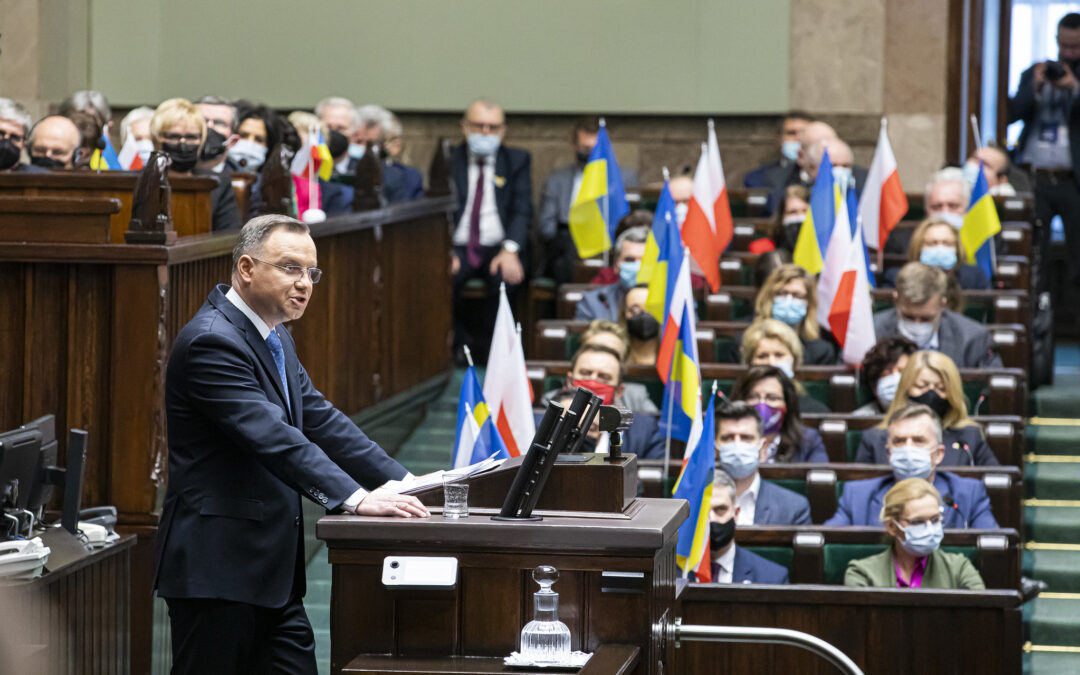Poland’s president has signed into law a set of new measures designed to help the huge numbers of Ukrainian refugees who have arrived since Russia’s invasion.
Almost 1.8 million people have crossed into Poland from Ukraine since 24 February, the Polish border guard announced this morning. While some have subsequently moved on to other countries, a significant proportion have remained in Poland.
Since Russia's invasion of Ukraine, more people have crossed into Poland alone than came to Europe as a whole in the refugee crisis of 2015, notes a deputy interior minister.
"No state administration in the world was prepared for such a wave of refugees" https://t.co/GKfjfZTJc8
— Notes from Poland 🇵🇱 (@notesfrompoland) March 14, 2022
The new legislation, which was signed by President Andrzej Duda on Saturday night, will, among other things, allow Ukrainians who have arrived in Poland to legalise their stay for 18 months.
The upper house of parliament, the Senate, where the opposition have a majority, had proposed granting the indefinite right to remain legally, but this was rejected by the more powerful lower-house Sejm, where the ruling Law and Justice (PiS) party dominates, reports the Polish Press Agency (PAP).
However, after nine months, those whose stay has been recognised as legal can apply for a three-year temporary residence permit, notes PAP.
The new law will also make it easier for Ukrainians to receive a national identity (PESEL) number, to work and to access benefits, healthcare and education. Tens of thousands of Ukrainian children have already registered at Polish schools, and many more – potentially hundreds of thousands – are expected to do so.
The law provides a special one-off payment of 300 zloty (€63) per person to be paid to Ukrainian refugees. It also grants payments of 40 zloty per day to people and entities in Poland that provide accommodation to Ukrainian refugees, as many have already been doing.
Deputy interior minister Paweł Szefernaker announced that people hosting Ukrainian refugees will be able to apply for the subsidy from Wednesday this week, reports Business Insider Polska. The money will also be paid retrospectively for the time people have already hosted Ukrainians, he said.
Meanwhile, for the more than one million Ukrainians who were already living in Poland before the war, constituting the country’s largest immigrant group, visas and residence permits that would have expired while the war is ongoing will be extended until the end of this year.
The most controversial part of the legislation initially proposed by the government – a clause granting immunity to officials for violating public finance laws when making decisions relating to emergency situations – was eventually removed entirely after three PiS MPs joined the opposition in voting against it.
Zwycięstwo! 💪 Bezkarność poza ustawą! Nie osiągnięto większości bezwzględnej. Zabrakło im jednego głosu. Wielki sukces opozycji! 🤝https://t.co/Z5OtQeTcbx
— Michał Szczerba (@MichalSzczerba) March 12, 2022
A proposal by the Senate to extend the new forms of assistance for refugees to third-country nationals who have fled to Poland was, however, rejected by the Sejm.
Some rights groups have warned that non-Ukrainians who were resident in Ukraine before the war and have now fled to Poland face exclusion from many forms of support, which are often being provided only to Ukrainian citizens.
A legal scholar, Marcin Kiełbasa from Krakow University of Economics, told legal news website Prawo.pl that the exclusion of third-country nationals and stateless people from the new legislation could violate European Union provisions and therefore cause problems in securing EU funds for refugees.
After the refugee law was approved by the Sejm on Saturday it was then signed by President Duda and went into force the same evening.
The next day, Janusz Cieszyński, the secretary of state for cyber security, noted that a Ukrainian woman called Oksana from the town of Starokostiantyniv had become the first person to be granted a PESEL number under the new system.
Poland’s family and social policy minister, Marlena Maląg, yesterday declared that “for 18 days [since the Russian invasion] Poland has been equal to the challenge, helping Ukrainians who, in this difficult time of war, seek refuge”.
However, while Polish state institutions, local authorities, NGOs and individuals have rallied to provide support to refugees, a number of large Polish cities have declared over the last week that they are struggling to cope with the influx. They have called on the government to seek EU and UN help.
Main image credit: M.Marchlewska- Wilczak/Kancelaria Senatu (under CC BY-NC-ND 2.0)

Daniel Tilles is editor-in-chief of Notes from Poland. He has written on Polish affairs for a wide range of publications, including Foreign Policy, POLITICO Europe, EUobserver and Dziennik Gazeta Prawna.




















